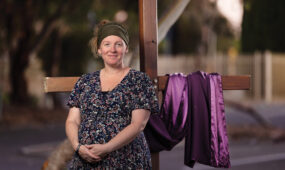Catholic agencies lose out in major homelessness funding shake-up
Local
Changes to the way the State Government delivers homelessness services in the city and southern suburbs has had a major impact on Hutt St Centre, Catherine House and the St Vincent de Paul Society.

Chris Burns, chief executive officer of the Hutt St Centre, which has delivered case management services for 11 years to the 850 clients who visit its meals and wellbeing centre each month, described the loss of $1.2m in funding as “very disappointing”.
Human Services Minister Michelle Lensink announced last month a major shake-up of homelessness services involving the creation of five alliances, including the new Adelaide South alliance headed by Lutheran Care.
Advertisement
Hutt St Centre was part of an unsuccessful alliance for the Adelaide South tender, as was the St Vincent de Paul Society and Catherine House which also lost $1.2m each.
“This decision does not mean the end of Hutt St Centre. It is, however, the cessation of a significant government-funded program,” Mr Burns said.
The centre has been providing specialist homelessness crisis intervention services through the Eastern Adelaide Generic Homelessness Service (EAGHS), supporting a total of 7740 clients, with an average of 90 per cent of program participants no longer experiencing homelessness at the end of their period of support.
Mr Burns said over the past three years and through the COVID-19 pandemic, Hutt St Centre exceeded the government-set KPIs on average by 37 per cent each year.
“It is unfortunate that we will not be able to offer the case management that assures a continuum of care for our clients through integrated on-site services,” he said.
“Due to the demand of people requiring support, and to ensure the best outcome for our clients, Hutt St Centre found it necessary to subsidise the program to the value of more than $400,000 a year.
“We will ensure our doors remain open to people at risk of or experiencing homelessness through the provision of donor-funded wellbeing services in our Wellbeing Centre, our Social Impact Bond-funded Aspire Program – which provides long-term case management – and our Federal Government-funded Aged City Living program.
Mr Burns said the successful alliance had reached out to initiate discussions on how it might work together to provide the best support to people at risk of or experiencing homelessness.
The St Vincent de Paul Society (SA) said the tender decision meant a significant funding cut to the Society’s Vinnies Men’s Crisis Centre in Whitmore Square, which houses close to 50 men each night.
Louise Miller Frost, CEO of the Society said without this funding the centre would be unable to operate in its current crisis accommodation form and the organisation is currently considering other service models to maintain its commitment to serving people experiencing homelessness.
“While we respect the government’s intention to provide a more joined-up service for people facing homelessness, the fact is the sector already operates under a collaborative model,” she said.
Advertisement
“Most recently this has been demonstrated through the Adelaide Zero Project, which was largely run by contributions and pro bono work from agencies in the sector, many of whom have just been defunded.
“What is really needed, is more social housing. Cutting funding to existing services and bringing new players into the sector will make no difference to the numbers of people experiencing homelessness unless there is more social housing for people to move into.
“Meanwhile funding cuts to services like the Vinnies Men’s Crisis Centre will lead to more rough sleepers on the streets in the short term at least. Leading into winter, nobody wants to see that.”
Catherine House, which was established by the Sisters of Mercy and recently merged with Housing Choices Australia, said it would lose $1.2 million of State Government funding for crisis accommodation and case management services for women fleeing domestic violence.
General manager Julie Duncan said it was not clear “where we fit” in the new alliance model and the system was currently “overwhelmed”.
Ian Cox, former chief executive of Hutt St Centre and now head of the State Government’s Homelessness Sector Integration, said he had not been involved in the evaluation of the tenders but he believed the new model would provide better outcomes for clients.








Comments
Show comments Hide comments